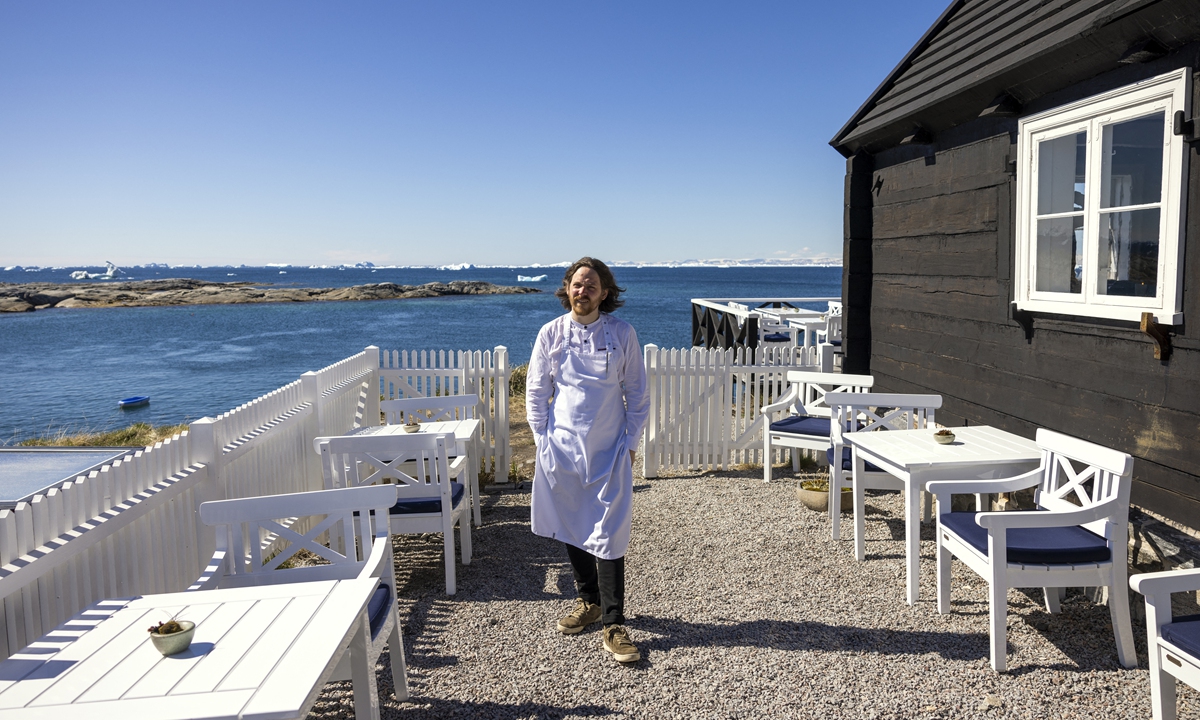
Double-Michelin-starred Faroese chef of KOKS restaurant Poul Andrias Ziska is photographed outside the restaurant in Ilimanaq, Greenland on June 28, 2022. Photo: AFP
You can only get there by boat or helicopter, but Michelin-starred chef Poul Andrias Ziska hopes his restaurant in remote Greenland, far above the Arctic Circle, is worth the journey.
The 30-year-old chef relocated his restaurant KOKS from the Faroe Islands in mid-June, leaving behind his relatively accessible address for Ilimanaq, a hamlet of 50 inhabitants hidden behind icebergs on the 69th parallel north.
Housed in a narrow black wooden house, which is one of the oldest in Greenland, the restaurant can only accommodate about 20 people per service, and experiments with local produce, including whale and seaweed, with fresh produce almost impossible to find in the harsh climate.
"We try to focus on as much Greenlandic products as possible, so everything from Greenland halibut to snow crabs to musk ox to Ptarmigan, different herbs and different berries," the tousled-haired, bearded chef tells AFP.
The young chef previously ran KOKS at home in the remote Faroe Islands, where he won his first star in 2017, his second in 2019, and the title of the world's most isolated Michelin restaurant.
He plans to return there for a permanent installation, but explains he had always wanted to stretch his gastronomical legs in another territory in the far north, like Iceland, Greenland or even Svalbard.
He finally chose Ilimanaq, located an hour's boat trip from Ilulissat, the third-largest town in Greenland and famous for its huge glacier.
Local products"We just found it more suitable, more fun to do something completely different before we move back in our permanent restaurant," he tells AFP from his kitchen, set up in a trailer outside the house with the dining area.
With 20 courses, the extensive tasting menu will delight the taste buds for some 2,100 kroner ($280), excluding wine and drinks.
"The menu is exquisite and sends you to the far north and back," Devid Gualandris, a charmed visitor, tells AFP.
"From the whale bites to the wines, from the freshly caught fish and shellfish to the curated desserts, everything is bursting with flavor."
While whale meat is a staple food in Greenland and Ziska's native Faroe Islands, whaling is banned in most of the world and activists have called for an end to the practice.
An unlikely locale for a gourmet restaurant, Ilimanaq - Greenlandic for "place of hope" - is home to a small community living in picturesque wooden houses, next to hiking trails and more fittingly a luxury hotel, making it an ideal stopover for wealthy tourists seeking to explore new frontiers.
For Ziska, the customers in Greenland are different.
"There are a lot of people for which the number one priority is to visit Greenland and then they come to our restaurant," he says.
"In the Faroe Islands we had mainly people interested in coming and eating at our restaurant and then obviously also visiting the Faroe Islands."
In addition to the adventurers who have already been lured by the Arctic landscape, the Greenlandic Tourist Board hopes the restaurant will also help attract gourmet travelers.
"The unique combination of high-level gastronomy, the inherent sustainability of the North Atlantic cuisine and the characteristic nature and resources of the Disko Bay, speaks to all our senses," Visit Greenland's director Hjortur Smarason said.
AFP




